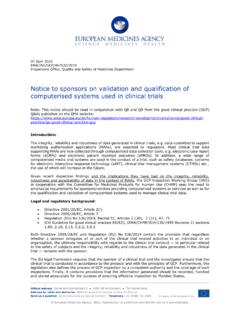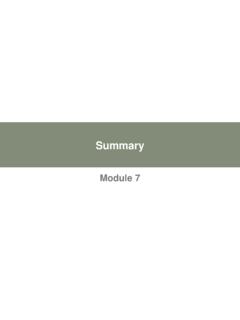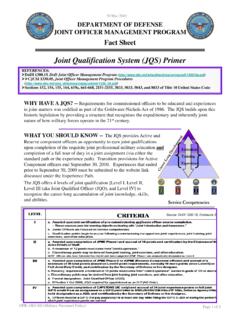Transcription of MPOETC 2020 Requirements for Firearms Qualification
1 MPOETC 2020 Requirements for Firearms Qualification Title 37, Section 203 establishes the following regulatory Requirements related to police Firearms Qualification . The Municipal Police Officers Education and Training Commission (Commission) is required to publish Requirements related to police Firearms Qualification . (3)(i) The minimum passing score for a Firearms course is 75%. (11)(ii)(A) All waiver-of-training applicants and basic cadets must meet the Commission s standards for Firearms Qualification . (11)(ii)(A); (3)(i) All certified officers must complete annual Qualification on a police Firearms course with any Firearms authorized for use, including personal weapons.
2 (b)(1)(i) .38/380 is the minimum acceptable caliber for police Firearms Qualification (16)(i) Firearms instructors can refuse to qualify an individual on a weapon they have determined is unsafe, inadequate or not appropriate for police training. (16)(i) Failure to meet the Commission s standards for Firearms Qualification is grounds for revocation of certification. (a)(3) MPOETC previously provided standards for annual Firearms Qualification that were intended to be used by departments when developing their Qualification courses. This allowed a great amount of freedom for departments but also resulted in a lack of standardization across the state.
3 Beginning in 2020, MPOETC will require all certified municipal police officers to qualify on a standardized course of fire for duty weapon (handgun) Qualification . The two-phase course mimics the course required in the basic training program but reduces the number of rounds from 60 to 50-rounds and has been modified to streamline use at the department level. The course specifies that officers use duty ammunition for at least the first phase of the course and also provides accommodation for departments who are required to qualify on reduced-distance ranges. A modified course is also provided and is intended to be used for back-up duty weapons or off-duty weapons if the department chooses to qualify officers on them.
4 This course reduces the maximum shooting distance from 25 to 15 yards to accommodate short barreled handguns and is also intended to be used to qualify retired officers. Due to the variety of holsters, locations of carry, and security features, this second course does not require a holster and allows shooters to begin each stage holding the weapon. Rifles and Shotguns The Requirements for shotguns or rifles have not changed. These qualifications must be completed on a generally accepted law enforcement Qualification course for those weapons. In situations where an officer is assigned a rifle or shotgun, he/she should qualify with that weapon.
5 In situations where armory stored weapons will be used by multiple officers, all officers authorized to pull Firearms must qualify on each weapon system or platform (AR, etc) but not on each individual weapon. Firearms Instructors All basic academy Firearms training and qualifications must be accomplished by Municipal Police Instructors employed by certified police academies. All annual Firearms Qualification for in-service police officers must be conducted by a Certified Law Enforcement Firearms Instructor. Firearms Instructors who have successfully completed Firearms instructor training can submit an application and, once approved by MPOETC , are authorized to conduct annual qualifications in Pennsylvania.
6 More information about applying to be a Certified Law Enforcement Firearms Instructor is available on the MPOETC website at Documentation Firearms instructors and Police Chiefs are responsible for producing and maintaining documentation of in-service Firearms qualifications to include the number of rounds fired, individual scores, and Firearms used. Annual Firearms qualifications must be documented in the MPOETC Training and Certification System (TACS). At a minimum, each officer s primary duty weapon Qualification must be entered by the end of each calendar year to maintain certification. Qualifications for additional weapon systems may be entered.
7 Officers for whom no Qualification is entered will show an expired certification ( MPOETC number) and will be removed from the Administrative Office of Pennsylvania Courts (AOPC) until a Qualification is entered. REMINDER: A weapon may not be carried on duty for which an officer is not qualified 2020 MPOETC Handgun Qualification Course (Two Phase Course) Phase One 25 Rounds Stage Yards Rounds Time Task Description 1 25 8 40 seconds Precision Fire from Cover From the 25-yard line, on the command to fire, shooter draws, takes cover, and fires 2 rounds standing right side of barricade, 2 rounds kneeling right side of barricade, 2 rounds kneeling left side of barricade, and 2 rounds standing left side of the barricade.
8 Firing is done using a Roll-Out technique, firing two rounds per exposure and using a different location for each exposure. When all 8 rounds have been fired the shooter should perform a tactical (magazine save) reload. Total time for 8 rounds is 40 seconds. 2 15 6 8 seconds Move to Cover From the 15-yard line, on the command to fire, shooter draws and fires 2 rounds at target, moves to the right 2-3 yards to kneel behind low cover or simulated cover and fires 1 round at target from behind cover. Total time for 3 rounds is 8 seconds. Repeat Drill moving to the left. 3 15-7 3 5 seconds Walk & Draw From the 15-yard line, on the command Walk, shooter begins walking toward the target.
9 On command to fire, shooter stops, draws, and fires 3 rounds in 5 seconds. 4 7 8 10 seconds One handed firing From the 7-yard line, on the command to fire, shooter draws and fires 2 rounds strong hand only from eye level, de-cocks or engages safety, transfers weapon to support hand and fires 2 rounds with support hand only from eye level. Total time for 4 rounds is 10 seconds. Repeat Drill. Instructions: All firing in this phase should be done using a two-handed grip unless otherwise annotated. All draws are from a snapped holster or if a concealed plainclothes holster. No alibis, except for an inoperable weapon.
10 Shooter must clear all stoppages. After firing at all stages, shooters will scan 360 for additional threats. Shooters will fire the course with full magazines and reload as necessary with no additional time accommodations. Only factory-new duty ammunition or currently issued duty ammunition will be used for this phase. Total 25 Rounds in this Phase TQ 21 target scored 5-3 (Possible 125 points in this phase) 75% or 94 points must be attained to successfully pass this phase. At this point in the course, instructors will change, mark or paste the target. **15-Yard Range Exceptions** The Handgun Qualification course requires a stage at the 25-yard line.











